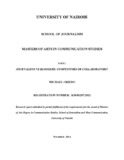| dc.description.abstract | nalyses on different happenings in the society. The practice has turned out to be
journalistic, with a good number of bloggers running authoritative and influential blogs,
where thousands of people flock for information.
In Kenya, blogs are now a permanent fixture in the media environment as their popularity
grows, with bloggers holding influence on political and social discourses. Their growing
influence has madebloggers share audiences with traditional media.
This study sought to find out how blogging is affecting journalism and how journalists
respond to and perceive the new threat. The study was guided by the following questions:
(i) Do bloggers consider themselves journalists? (ii) How do journalists perceive
bloggers? (iii) What roles do bloggers play? (iv) Do journalists collaborate or compete
with bloggers to inform public?
The research sampled 30 journalists in mainly two national media houses in Kenya,
namely Standard Group and Nation Media Group, 15 bloggers and three online media
editors. The findings reveal that most journalists read blogs because they find information
on the sites usefuland they are now getting ideas for their stories from the sites.
Further results show that bloggers do not think they should be trained as journalists and
lastly, the study concluded that bloggers and journalists do not compete to inform the
public, however, they collaborate. | en_US |

